“I’m tired of playing second fiddle to the ghost of Beethoven.”
|
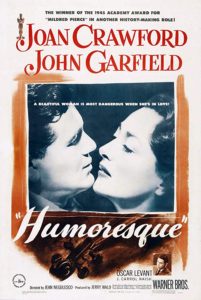
Synopsis:
A married socialite (Joan Crawford) becomes smitten with an aspiring violinist (John Garfield), and the pair are soon lovers — but will Crawford’s meek husband (Paul Cavanagh), Garfield’s disapproving mother (Ruth Nelson), or Garfield’s former girlfriend (Joan Chandler) stand in the way of their forbidden romance?
|
|
Genres, Themes, Actors, and Directors:
- Cross-Class Romance
- Jean Negulescu Films
- Joan Crawford Films
- John Garfield Films
- Musicians
- Oscar Levant Films
Review:
Clifford Odets co-wrote the screenplay for this adaptation (by Jean Negulescu) of Fannie Hurst’s melodramatic cross-class romance. One is tempted to say this is Joan’s show all the way, given she’s in peak form (her final moments on-screen are iconic) — but Garfield more than holds his own as a determined musician so devoted to his craft he has little authentic room for anything (or anyone) else. Levant becomes somewhat tiresome as Garfield’s always-wisecracking pianist-friend, though at least many of his lines are amusingly droll. The music (performed by Isaac Stern) is suitably moving, and Ernest Haller bathes the entire affair in a romantic glow. This would make an interesting double-bill with Rouben Mamoulian’s adaptation of Odets’ Golden Boy (1939), given that they serve as counterpoint stories about the choices and sacrifices one inevitably makes on behalf of talent, love, and family.
Redeeming Qualities and Moments:
- Joan Crawford as Helen Wright
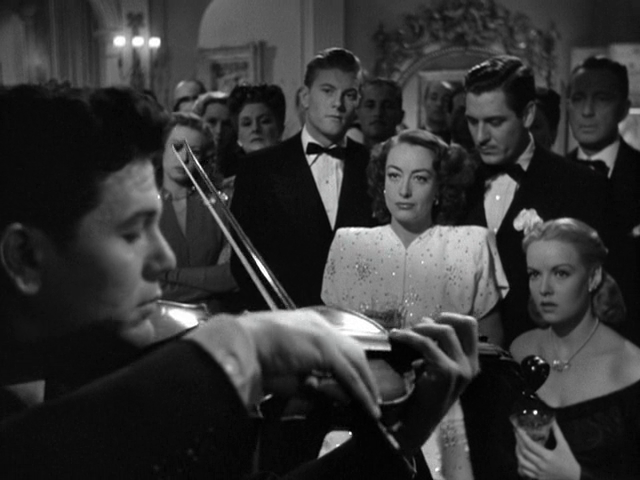
- John Garfield as Paul Boray
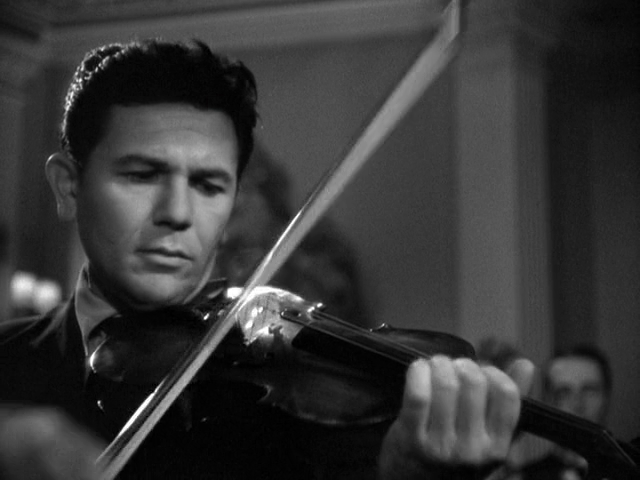
- Ernest Haller’s cinematography
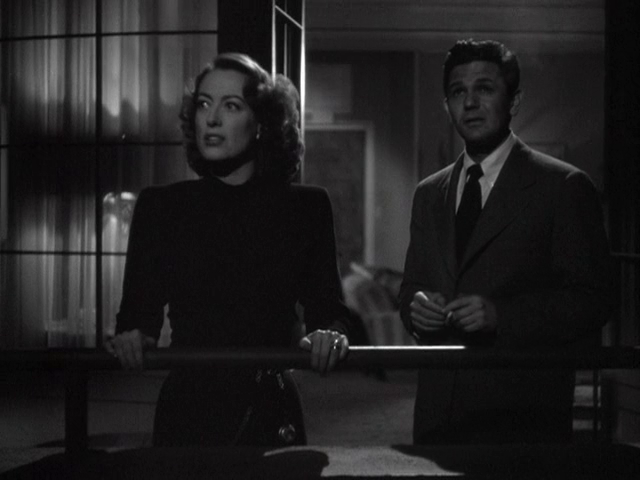
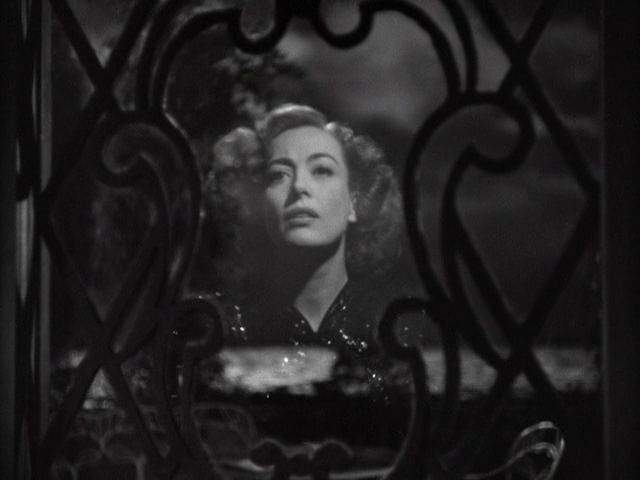
- Many fine musical sequences
Must See?
No, though naturally it’s a must for Crawford fans. Listed as a film with Historical Importance in the back of Peary’s book.
Links:
|
One thought on “Humoresque (1946)”
Agreed – not must-see, except for Crawford fans. As per my post in ‘The ’40s-’50s in Film’ (fb):
“There’s nothing very strange about me. I was married twice before: once at 16, once at 21. One was a cry-baby and the other was a caveman. Between the two of them, I said goodbye to girlhood.”
‘Humoresque’ (1946): Somewhere in the ’90s, TCM ran a day-long tribute to Joan Crawford. The promo commercial for it began with the following voice-over: “Joan Crawford: every gay man’s fantasy… every straight man’s nightmare.” Perhaps few of Crawford’s films embrace that tagline more than ‘Humoresque’ – possibly the most tortured and torturous love story of the ’40s.
Based on a short story by Fannie Hurst, it’s co-written by Zachary Gold (who had a short creative life in Hollywood and a short life; he died at age 34). Gold must have been in charge of all of the normal dialogue in the film – y’know, the way people actually and realistically talk? Because the other half comes from Clifford Odets – he of the flowery, the over-written, and sometimes the ‘What the fuck did he say?’
This isn’t just a sad story, it’s an insufferable one. John Garfield is Paul – a violinist full of himself – who comes under the wing of ‘Patron of the arts’ Joan – also full of herself. We know that about her right off (“I am constitutionally given to enthusiasm about nothing.”). She’s a woman of mystery (“It’s a woman’s privilege to be vague.”) who at one point perfectly sums up the Crawford philosophy (“Ever since I can remember, I’ve been a law to myself. People were stupid enough to put up with it.”).
Though it makes no sense for them to do so (they can hardly have a conversation without fighting), they fall in love – in such a way that we learn pretty quickly why Joan’s Helen has difficulty navigating her emotions (“I love you so I don’t care what I think of you.”).
Paul’s pianist buddy (Oscar Levant – verbosely irritating throughout) understandably finds Helen perplexing (“Tell me, Mrs. Wright… does your husband interfere with your marriage?” – his best line). Paul’s somewhat overbearing mom doesn’t approve of ‘loose women’ (“You know what she is. There’s something wrong with a woman like that.”). Helen’s love for Paul continues to not really reveal itself in practice in any way (“You don’t want me, Paul, I’m too wearing on the nerves.” …Well, yes, there’s that.) As Helen’s ‘rival’, charming Joan Chandler is given very few lines yet never stops pining for Paul; for both reasons, she suffers accordingly.
The complete emptiness of Helen’s existence is finally revealed near the film’s end (“I’ve lived a meaningless and absurd life among a lot of silly and rather futile people.”) – and by that time we really find ourselves wondering who the hell went to see this on Date Night?!
Director Jean Negulesco has fashioned all of this as romantically as possible but it’s a film that perfectly illustrates the beauty, benefits and common sense of the one-night-stand. Along the way, there’s a HUGE amount of glorious music – and Crawford’s Helen gets the perfect send-off: the classiest suicide in cinema history.